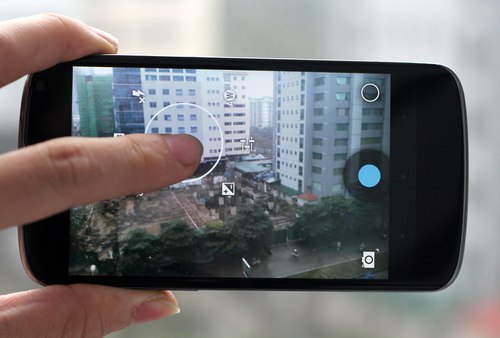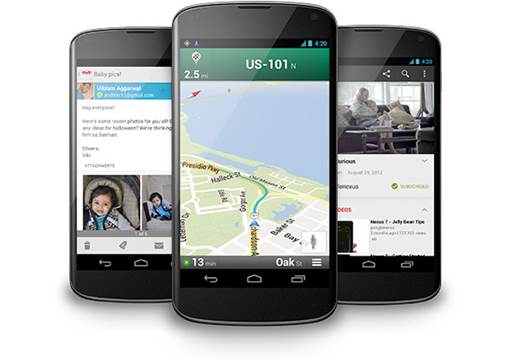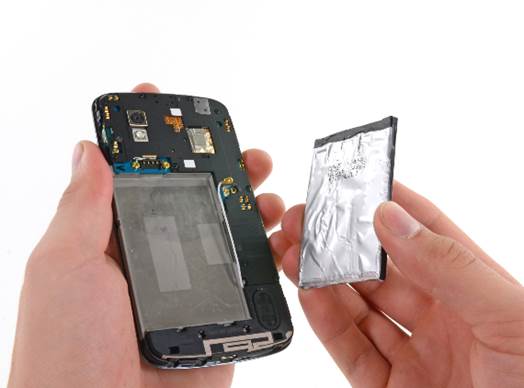Unlike Optimus G’s 13MP camera, Nexus 4’s
camera is equipped with an 8MP sensor. Photo-shooting is Nexus 4’s drawback, in
comparison with rivals like S III, One X, iPhone 5 though these feature similar
resolution. It is partly due to features on the pure Android can’t improve
image quality while the rest results from hardware.
If sufficiently lit condition, images from
Nexus 4 delivered colors which were fairly vivid yet not deep but this is not
so often. Thus if user doesn’t concern, photos will regularly display inaccurate
colors, especially greens. With indoor condition, white balance wasn’t high
appreciated.

Nexus
4’s camera is medium-level, not so excellent.
With light sources in the picture, the
photo sometimes showed glare. Because LG’s camera stayed quite close to the
back panel, in several cases there was also purple fringing like in iPhone 5. Nexus
4 camera’s sharpness was not on par with that in iPhone 5, One X+ or Galaxy S
III. In low-lit condition, image quality was quite good, noise level was
acceptable yet not much considerably enhanced.
It was high appreciated that Nexus 4’s
camera operated fluently in use, just one swipe and you would get into camera
interface. There’re focus and quick-capture though continue-shooting isn’t
available like in One X/One X+. Besides, in Android 4.2, Google equipped the
smartphone with a series of extended features such as filters like Instagram or
HTC Sense, plus a bunch of photo editors. Aside from HDR mode and Panorama,
Nexus 4 also has Photo Sphere mode, however the results are not as appealing as
from HDR and Panorama.
LG Nexus 4 supports Full HD 1080p video at
30fps. Image quality delivered quite real colors but noise was fairly high in
low-lit. Like other Androids, the product can also shoot photo while recording
video, requiring user to touch the screen. Like photo, video also comes with
its own editor.
Performance
Owning quad-core Qualcomm Snapdragon S4
1.5GHz processor, 2GB of RAM and Adreno 320 GPU, Nexus 4, among smartphones of
the 2012, has been top in many performance tests. It surpassed One X, S III or
Note II, Tegra 3 or Exynos 4 chipped models.
In AnTuTu Benchmark, with a score of
15,000, Nexus 4 was at the top in general performance test. In Nenamark 2 for
testing graphics, LG’s model also appeared superior at 59.1fps, close to the
top. However, in Quadrant Benchmark, surprisingly, it only got 4,800, left
behind by One X+, Note II or S III.

LG
Nexus 4 is the smartphone featuring the best performance, relative to the price
plus a great deal for any purposes, from modifying Android or programming
However, speaking of fluency in operation,
Nexus 4 is totally superior to rivals. Partly due to the origin interface, powerful
quad-core specs and Android 4.2, maneuvers of swiping, turning page, entering
or exiting apps were fast and sensitive, without lag. This is also the Android
that has the steadiest performance, compatible with a lot of apps, plus barely
gets stuck Force Close state. Sadly, Nexus 4 produces quite much heat, around
the camera. The device will quickly turns hot when user accessed 3G/Wi-Fi
networks or plays games.
To be fair, LG Nexus 4 is the smartphone featuring
the best performance, relative to the price plus a great deal for any purposes,
from modifying Android or programming to playing games, working and relaxing.
Battery life
Unfortunately, in our reporter’s test,
Nexus 4’s runtime was shorter than expected. However, in the same usage, Nexus
4’s battery was better than One X+ but weaker than Galaxy S III or iPhone 5.
Overall, this was acceptable.

Unfortunately,
in our reporter’s test, Nexus 4’s runtime was shorter than expected.
The device’s 2,100mAh battery is a drawback
for regular use, a usage including pushing mail from 2 accounts and keeping a Facebook
account online as well as 3G and Wi-Fi on continuously, the total time allotted
was nearly 14h. Meaning, the phone could last for a working day. If some
settings are changed, Nexus 4’s runtime may be up to 1.5 or 2 days.
Wrap-up
The price of $575 for a Nexus 4 (16GB) is
reasonable, for such features, technologies and performance that this device
brings. There’re still some downsides in camera’s quality and no card slot. But
the lower price than from rivals, like One X+ or SIII is compensated for this. in
brief, the collaboration of Google and LG has made the most comprehensively
best smartphone ever.
|
General info
·
2G network: GSM 850/900/1800/1900
·
3G network: HSDPA 850/900/1700/1900/2100
·
SIM: Micro-SIM
·
Release date: 2012, October
·
Status: Available
Body
·
Size: 133.9x68.7x9.1mm
·
Weight: 139g
Display
·
Technology: True HD IPS Plus, capacitive, 16M
colors
·
Resolution/screen size: 768x1,280pixel, 4.7in
(320ppi density)
·
Multi-pointing: Yes
·
Protect glass: Corning Gorilla Glass 2
Sound
·
Notification: Vibration; MP3, WAV ringtones
·
Stereo: Yes
·
3.5mm jack: Yes
Memory
·
Card slot: No
·
Internal storage/RAM: 8/16 GB storage/2 GB of RAM
·
Connectivity
·
GPRS: Yes
·
EDGE: Yes
·
Speed: DC-HSDPA/42 Mbps; HSDPA/21 Mbps; HSUPA/5.76
Mbps
·
WLAN: Wi-Fi 802.11 a/b/g/n, dual-band, DLNA,
Wi-Fi hotspot
·
Bluetooth: Yes, v4.0 with A2DP
·
NFC: Yes
·
USB: Yes, micro-USB (SlimPort) v2.0
Camera
·
Primary: 8MP, 3264x2448pixel, autofocus, LED
flash
·
Features: Touch to focus, tagging, face
detection, photo sphere
·
Video: Yes, 1080p@30fps
·
Sub-camera: Yes, 1.3MP
Equipment
·
OS: Android OS, v4.2 (Jelly Bean), origin UI
·
Chipset: Qualcomm APQ8064 Snapdragon
·
CPU: Quad-core 1.5 GHz Krait
·
GPU: Adreno 320
·
Sensor: Accelerator, proximity, compass,
barometer
·
Message: SMS(conversation), MMS, Email, Push
Mail, IM, RSS
·
Browser: HTML5
·
Radio: No
·
GPS: Yes, with A-GPS and GLONASS
·
Java: Yes, via Java MIDP emulator
·
Color: Black
·
Misc. : Social network integration; noise
reduction with integrated micro; TV out (via MHL A/V); MP4/H.264/H.263 video
player; MP3/WAV/eAAC+/AC3 music player; personal info manager; video/image
editor; document editor; Google Search; Maps; Gmail; YouTube; Calendar;
Google Talk; Picasa; note; voice-dialing; input prediction
Battery
·
Capacity: Li-Po 2100mAh (fixed)
·
Standby : (2G)/ up to 390h (3G)
·
Talk: (2G)/ up to 15h (3G)
|